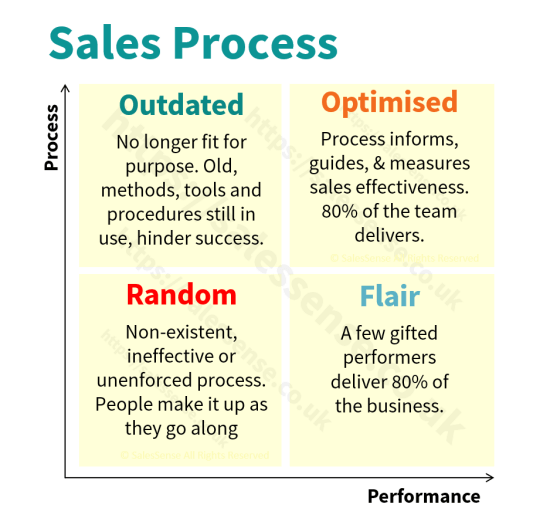On-the-job actions that develop sales planning and organisation skills.

Use the workplace actions below to increase sales effectiveness while improving interpersonal sales planning and organisation skills:
- Improve forethought, planning, and preparation.
- Develop anticipation and prediction abilities.
- Use a process to aid prediction, shorten sales cycles, and increase performance.
Gain or improve planning and organisation skills through anticipation:
Anticipate next year's sales target for your likely territory or sales responsibilities.
Make it more than a guess. First, consider historical trends in sales targets for your area and others that are similar. You can steer a ship by looking at the wake and predict the future by looking at the past.
Identify the external factors that are likely to affect the sales target decisions of your organisation's senior executives.
What is happening in the market? Is the size of the opportunity increasing or decreasing? Is there going to be more competition or less? Will your organisation's offering become more differentiated or more difficult to sell? Adopt a balanced perspective and guard against perceiving things as you would wish they were.
Take into account the short and medium-term aims and objectives of your organisation.
If you don't know what they are, ask those who do. Get past the superficial marketing hype and vision statements meant for public consumption. Discover the organisational ambitions of those who shape policy and missions including stakeholders - those whose money is invested.
Now that you have a good idea of what the organisation will need from you next year, get ahead of the game by formulating plans to achieve it. You must write down your plan. Planning is an iterative process. Each version is better than its predecessor. The more you revisit and rethink the plan, the better it will become.
Use your plan to embrace what you will have to do to make the plan work.
What can you do in advance to increase the certainty of success? Do you have all the necessary knowledge, skills, and abilities? Do you have the right relationships, resources, and support?
More on sales planning:
Gain or improve planning and organisation skills through discussion:
Discuss the likely futures of prominent customers with those customer staff who are most invested in their organisation's success.
This might seem scary or presumptuous. Face down any anxiety you feel and try it. For all of us, there is nothing more interesting or worthy of discussion than a future we are invested in. All you need to do is to ask for the opinions of those who are invested and with whom you have a trusting relationship. Be ready to share your candid observations.
Carrying out this action is highly likely to strengthen relationships, increase your personal standing, and move you closer to trusted adviser status.
Discuss the likely future of your organisation.
Ask managers and senior executives for their opinions about your organisation's strengths, opportunities, weaknesses, and threats.
Pose questions about reported market trends, market share, and anticipated disruptors.
Seek out the most successful individuals in your network and ask them to share what factors they attribute their success to.
Having a good understanding of what makes people successful improves the ability to perceive the likely outcomes of new circumstances, unexpected events, and the actions of the people involved. See the Sales Club download, Think and Grow Rich.
These articles offer further ideas:
Gain or improve planning and organisation skills through a process:
Create, adopt, or learn a sales process and use it.
There are numerous credible studies carried out by independent consultants that all report the significant sales performance benefits of using a sales process. A few Google searches will lead you to lots of examples.
It may be that your organisation already insists that its salespeople make use of a sales process and enforce its use through measurement, feedback, and motivation. Most do not. Some organisations have a sales process that is expected to be used but is not mandatory. Others have a rudimentary process embedded in their CRM. Few take full advantage of the power of anticipation and consistency that an effective sales process embodies.
If an effective sales process exists, learn it and make full use of it. If the process is not effective, work to change it by engaging with those in your organisation who are interested in increasing sales performance. If there is no sales process, adopt one that is aligned with your sales environment or if nothing seems to fit, create your own.
Build your sales process around the customer's buying process.
All of your customers have at least one thing in common, the need for your products, services, or solutions. When you examine customer buying journeys it quickly becomes clear that they all follow a similar pattern. A sales process should serve the customer's buying process by helping them reach the right decision in the shortest practicable time.
Additional ways to develop sales planning skills:
Get the entire collection of over 100 hyperlinked on-the-job sales skills development actions together with our sales skills assessment in a neat indexed PDF document.
If you need to improve sales planning and organisation skills get in touch. Telephone +44 (0)1392 851500. We will be pleased to discuss your needs or talk through some options. Alternatively, send an email to custserv@salessense.co.uk for a prompt reply or use the contact form here.












